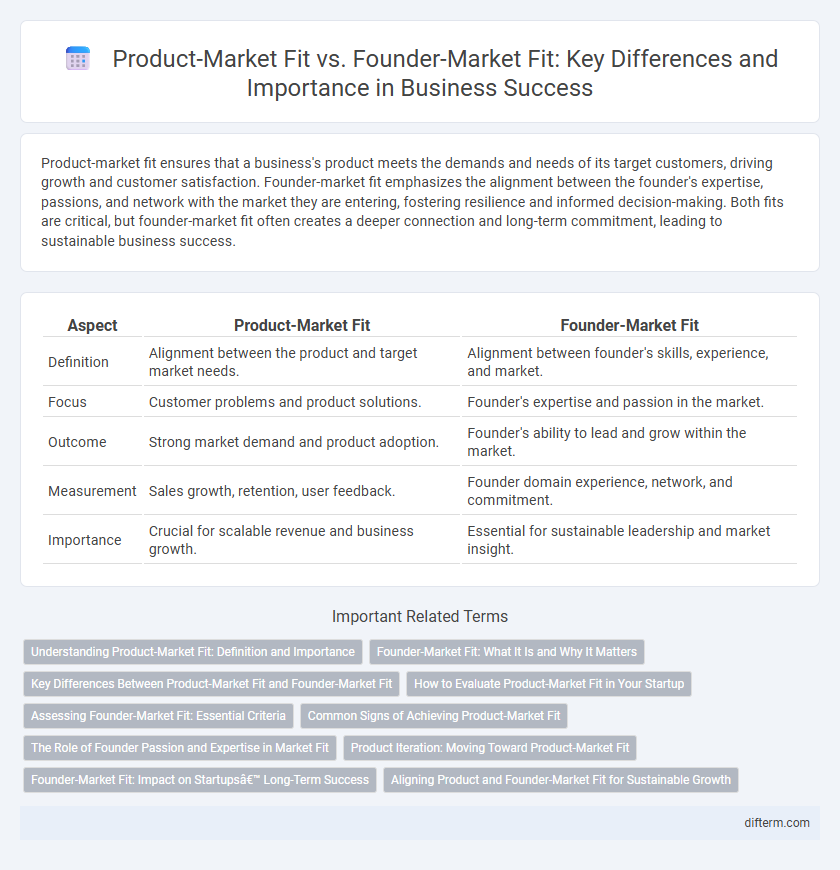Product-market fit ensures that a business's product meets the demands and needs of its target customers, driving growth and customer satisfaction. Founder-market fit emphasizes the alignment between the founder's expertise, passions, and network with the market they are entering, fostering resilience and informed decision-making. Both fits are critical, but founder-market fit often creates a deeper connection and long-term commitment, leading to sustainable business success.
Table of Comparison
| Aspect | Product-Market Fit | Founder-Market Fit |
|---|---|---|
| Definition | Alignment between the product and target market needs. | Alignment between founder's skills, experience, and market. |
| Focus | Customer problems and product solutions. | Founder's expertise and passion in the market. |
| Outcome | Strong market demand and product adoption. | Founder's ability to lead and grow within the market. |
| Measurement | Sales growth, retention, user feedback. | Founder domain experience, network, and commitment. |
| Importance | Crucial for scalable revenue and business growth. | Essential for sustainable leadership and market insight. |
Understanding Product-Market Fit: Definition and Importance
Product-market fit occurs when a product satisfies a strong market demand, evidenced by rapid customer adoption and sustained revenue growth. Achieving product-market fit validates that the product effectively addresses real customer pain points, driving business scalability and competitive advantage. Understanding this concept is crucial for startups to optimize product development and avoid premature scaling.
Founder-Market Fit: What It Is and Why It Matters
Founder-market fit refers to the alignment between a founder's skills, experiences, and passions with the specific market they are targeting. This alignment enhances innovation, decision-making, and resilience, increasing the likelihood of startup success beyond just having product-market fit. Understanding and prioritizing founder-market fit can lead to more authentic solutions and stronger connections with customers, driving sustainable growth.
Key Differences Between Product-Market Fit and Founder-Market Fit
Product-market fit occurs when a product meets clear market demand, validating customer needs and generating sustainable traction. Founder-market fit means the founder's skills, experiences, and passions align closely with the target market, enhancing customer insights and execution capability. Key differences include focus areas: product-market fit centers on customer validation and demand, while founder-market fit emphasizes founder-market alignment and long-term strategic advantage.
How to Evaluate Product-Market Fit in Your Startup
Evaluating product-market fit in your startup involves analyzing customer feedback, retention rates, and growth metrics to understand if your product effectively solves a target market's problem. Key indicators include high user engagement, consistent revenue growth, and low churn rates, signaling alignment between product features and market needs. Leveraging data analytics tools and conducting regular user interviews helps refine your value proposition and ensure sustainable scalable demand.
Assessing Founder-Market Fit: Essential Criteria
Assessing founder-market fit involves evaluating the alignment between a founder's expertise, passion, and network with the target market's needs and dynamics. Key criteria include deep industry knowledge, prior experience solving relevant problems, and authentic connections within the customer base that facilitate trust and market insight. Strong founder-market fit accelerates decision-making, customer acquisition, and product iteration essential for business success.
Common Signs of Achieving Product-Market Fit
Common signs of achieving product-market fit include rapid user growth, high customer retention rates, and increasing revenue streams, indicating strong market demand. Positive customer feedback and low churn signify that the product effectively solves critical pain points. When sales cycles shorten and organic referrals rise, it reflects alignment between the product features and market needs, confirming product-market fit.
The Role of Founder Passion and Expertise in Market Fit
Founder passion and expertise significantly influence achieving product-market fit by aligning the product development process with deep market insights and customer needs. This intrinsic motivation drives relentless problem-solving and innovation, fostering a product that resonates authentically within the target market. Understanding industry dynamics and customer pain points through founder expertise accelerates validation cycles, reducing time-to-market and enhancing competitive advantage.
Product Iteration: Moving Toward Product-Market Fit
Product iteration plays a critical role in moving toward product-market fit by continuously refining features based on user feedback and market demands. Founders aligned with their market possess unique insights that accelerate iteration cycles and enhance product relevance. Emphasizing rapid experimentation and data-driven adjustments fosters a product that solves real customer problems and gains sustainable traction.
Founder-Market Fit: Impact on Startups’ Long-Term Success
Founder-market fit directly correlates with a startup's long-term success by aligning the founder's skills, passions, and experiences with the target market's needs. Studies show startups with strong founder-market fit are 30% more likely to achieve sustainable growth and resilience against market fluctuations. This alignment enhances strategic decision-making, product innovation, and team dynamics, ultimately fostering enduring competitive advantage.
Aligning Product and Founder-Market Fit for Sustainable Growth
Achieving sustainable growth requires aligning product-market fit with founder-market fit by ensuring the founder's expertise, passion, and values resonate deeply with the target market's needs and pain points. This alignment enhances strategic decision-making, accelerates product adoption, and builds authentic customer relationships critical for long-term business success. Metrics such as customer retention rates, founder engagement levels, and market feedback loops provide valuable insights to optimize this synergy.
Product-Market Fit vs Founder-Market Fit Infographic

 difterm.com
difterm.com